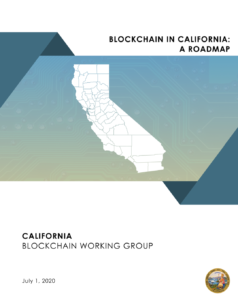On July 1, 2019, the California state government established a multistakeholder blockchain technology working group to evaluate the risks, benefits, best practices, and legal implications of blockchain for the people of California.
Camille Crittenden, CITRIS Policy Lab Co-Founder and Executive Director of CITRIS and the Banatao Institute, is serving as the chair.
The Government Operations Agency formed the Blockchain Working Group as part of the implementation of AB 2658 (Calderon, Chapter 875, Statutes of 2018, G.C. 11546.9) requiring that the Secretary of the Government Operations Agency appoint a blockchain technology working group and chairperson by July 1, 2019.
This group is charged with:
-
- Evaluating blockchain uses, risks, benefits, legal implications, and best practices;
- Defining the term blockchain; and
- Recommending amendments to other statutes that may be impacted by blockchain
The Blockchain Working Group issued its final report “Blockchain in California: A Roadmap” in July 2020, which includes the potential uses, risks, and benefits of blockchain to state government and California-based businesses as well as amendments to existing law that may be impacted by the deployment of blockchain.



